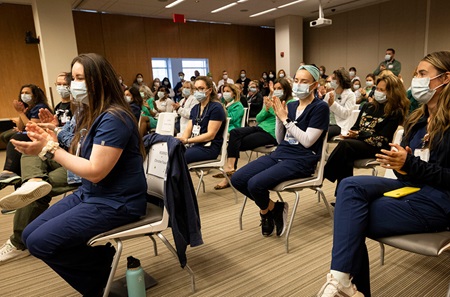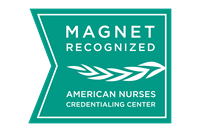Allison Benziger, MSN, RN-BC, Magnet program director (second from left), with, left to right, Hubert Hsu, MSN, RN-BC, MNO Unit; Jordan Mento, BSN, RN, Float; and Christine Trusiani, BSN, RN-BC, ACE Unit. Hsu, Mento, and Trusiani were among four dozen nurses across PMC who served as Magnet champions for their hospital units.
Congratulations to nurses throughout Princeton Medical Center (PMC), which has earned redesignation as a Magnet® recognized organization, the gold standard for nursing excellence.
The designation – PMC’s third – was announced March 17 by the Commission on Magnet during a virtual meeting with nurses, other staff, and senior leaders from across the Penn Medicine Princeton Health system. The decision was based on results of a three-day virtual site visit and the exceptional quality and patient experience outcomes documented in the extensive Magnet application.
“At PMC and across Princeton Health, we have a strong culture of pursuing excellence and challenging ourselves to meet higher standards of quality care and patient experience,” said CEO James Demetriades. “This is definitely true of our nurses, as evidenced by a third Magnet designation.”
Approximately 180 hospitals – less than four percent of hospitals nationwide – have earned Magnet designation three or more times, noted Sheila Kempf, RN, PhD, vice president of patient care services and chief nursing officer at Princeton Health.
Magnet® redesignation 2022. Left to right, Craig Gronczewski, MD, chief medical officer; Karyn A. Book, MSN, RN, associate chief nursing officer; Sheila G. Kempf, RN, PhD, chief nursing officer; Allison Benziger, MSN, RN-BC, Magnet® program director; Kari A. Mastro, PhD, RN, director of professional practice, innovation, and research; and Reina Fleury, chief human resources officer.
“This is an impressive distinction,” Kempf said. “Magnet is the result of a rigorous and comprehensive evaluation of our professional practices, leadership, clinical outcomes, staff nurse satisfaction, and patient experience. Congratulations to our staff who went above and beyond to earn this achievement. Their dedication to excellence and passion for this organization, our patients, and each other are exemplary.”
The Commission on Magnet, part of the American Nurses Credentialing Center, commended PMC for 11 exemplars, or exemplary professional practices, during the virtual meeting. Three exemplars related to nurse certification rates; the percentage of nurses with a Bachelor of Science in Nursing (BSN) or higher degree; and nurse satisfaction results that outpace national benchmarks.
Additionally, PMC excelled in four nursing-related clinical outcomes, including prevention of:
- Falls that cause patient injury;
- Hospital-acquired pressure injuries;
- Central line-associated bloodstream infections
(better known as CLABSI);
- Catheter-associated urinary tract infections (CAUTI).
 Finally, PMC was commended for exemplary performance in four nursing-related patient experience measures: patient engagement; patient education; courtesy and respect; and careful listening.
Finally, PMC was commended for exemplary performance in four nursing-related patient experience measures: patient engagement; patient education; courtesy and respect; and careful listening.
While Magnet is a nursing recognition, Kempf thanked physicians, other professionals, and staff members throughout Princeton Health whose contributions support the Magnet journey and influence crucial factors such as quality care and patient satisfaction.
The Magnet designation is effective for four years. PMC previously received Magnet designations in 2012 and 2017.
Penn Medicine’s five other hospitals all hold Magnet designation as well.
Five Key Attributes of Magnet® Hospitals
 Nurses are top tier. At Princeton Medical Center (PMC), 82 percent of nurses hold a Bachelor of Science in Nursing (BSN) or higher degree, and more than half hold specialty certifications, above national benchmarks.
Nurses are top tier. At Princeton Medical Center (PMC), 82 percent of nurses hold a Bachelor of Science in Nursing (BSN) or higher degree, and more than half hold specialty certifications, above national benchmarks.- Nurses are empowered. PMC’s application for Magnet redesignation is filled with case studies of front-line nurses who identified clinical care issues on their units and then led efforts to address them.
- Nurses are engaged. When announcing PMC’s redesignation, the Commission on Magnet noted that nurse satisfaction levels in the hospital units outpace national benchmarks.
- Patients receive quality care. PMC was commended for its clinical performance, particularly in four areas related to prevention of falls and hospital-acquired injuries or infections.
- Patients are happy. The Commission on Magnet commended PMC for performance related to patient engagement, patient education, courtesy/respect, and careful listening. PMC ranks among New Jersey’s best hospitals for patient satisfaction, according to the most recent data published by the federal government.